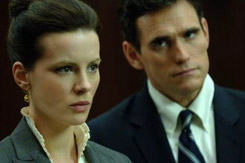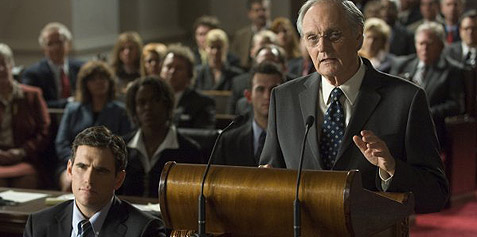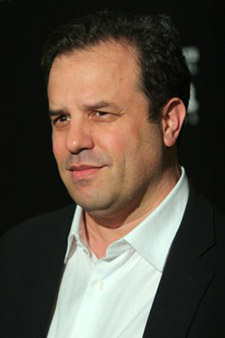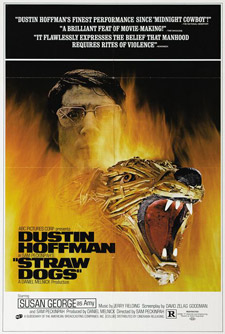
Interview date: 03/02/2009
Run date: 03/09/2009
Movies Home / Entertainment Channel / Bullz-Eye Home
Given the amount of recognition Rod Lurie has earned as a director in recent years, it’s odd to think that he used to be a film critic as well. Given that he’s been on both sides of the fence, however, it probably makes his positive reviews all that much sweeter, since he knows how hard critics are to please. Fortunately, they’ve been quite kind to Lurie’s latest film, “Nothing but the Truth,” which has come to DVD after studio problems prevented a proper theatrical release. Bullz-Eye spoke to Lurie about his work with the film’s tremendous cast (including Kate Beckinsale, Matt Dillon, and Alan Alda) and what it took to make an actor out of attorney Floyd Abrams, why Roger Ebert is a real man, and why he’s tackling a reimagining of Sam Peckinpah’s “Straw Dogs.”
Rod Lurie: Hi, Will, it’s Rod Lurie.
Bullz-Eye: Hey, it’s a pleasure to talk to you.
RL: Hey, yeah, me, too. I like your site.
BE: Oh, thanks.
RL: Do you own the site?
BE: No, I’m just one of the associate editors.
RL: Well, it’s really pretty good. I used to go to it for the sports. It’s very cool, especially your NFL draft coverage.
BE: Oh, most definitely, yeah. John Paulsen and Anthony Stalter are some our best writers when it comes to that stuff.
RL: No, it’s really great. I’m such an NFL fucking fanatic. I used to go to anything, absolutely anything, that I could. And I also followed it for the fantasy football and all of that. Anyway, I’m sorry I keep yapping about unimportant things…
BE: Hey, if you want to praise our site, I never have complaints about that. But to go ahead and get on topic, how did the road to “Nothing But the Truth” begin? I mean, obviously it’s inspired by true life events, but were you just watching the news one day and said, “There’s a film in this”?
RL: Well, you know, to be honest with you, I was fired off a television series called ‘Commander in Chief” that I created, and I had come up with a story line very similar to this. When Steven Bochco took over for me, he pretty much took a flame thrower to almost every idea that was mine. Anything he could get rid of, he did, including that idea. So I had this idea about a journalist that is being thrown into jail for protecting a source that he had written something about, and how Geena Davis, her character, the President, would deal with that. In the show, what was going to happen was she was going to pardon that person. But I just wanted to do a story about…well, in that world. And then Judith Miller went to jail for protecting a source, and I thought, “What if someone like Susan McDougal, who was a real diehard, was going to spend years in jail rather than capitulate with the federal prosecutor. What if the reporter, had children? What would that mean to the equation?” It’s like almost everything I have ever done: I’ve taken something from real life and worked off of it. For example, I made a movie years ago called “The Contender,” which was about a woman who was nominated to be vice president by the president and had to be confirmed by the congress and the senate. And she had a sex scandal in her past. That was inspired by watching Clarence Thomas. I said, “What if Clarence Thomas had been a woman, and we heard all this sexual stuff? How comfortable would the country have been with that?” So the old double standard.
BE: Right.
RL: By the way, I want to ask you a quick question before we continue.
BE: Absolutely.
RL: Are you doing this as a Q&A or…
BE: Yeah, we just do a straight up Q&A.
RL: Okay, that just influences how I answer. I try to raise the level of my articulation of answers. (Laughs)
BE: That’s alright. And just to put your mind at ease, anytime we’re doing one of those and there’s like a lengthy impassioned speech, I’ll usually pepper it with a “really?” or an “I see” from me, so that it’s not such a huge mass of text.
RL: (Laughs) All right. Have you received the DVD of “Nothing but the Truth”?
BE: Yeah. Actually, I watched it this morning.
RL: Oh, I see. Okay.
BE: Yeah, I loved it.
RL: Oh, good!
BE: I was actually a big fan of “Commander in Chief” as well…and “The Contender,” too, for that matter.
RL: Oh, thank you very much.
BE: With “Nothing but the Truth,” you certainly had a great cast to work with, that’s for sure.
 RL: Well, it is a remarkable cast. You know, most of the people in it are operating outside of the sweet spots that have been giving them success. Kate Beckinsale…it’s not a romantic comedy, nor is it an action film, and she is more or less going back to the roots of her independent success, when she did movies like “Cold Comfort Farm,” or when she did “Much Ado About Nothing” or “The Last Days of Disco.” I think she was in that. I better check on that before I look like a fool. And Matt Dillon…I think he’s wearing a suit for the first time in God knows how long. That was a fun cast to put together.
RL: Well, it is a remarkable cast. You know, most of the people in it are operating outside of the sweet spots that have been giving them success. Kate Beckinsale…it’s not a romantic comedy, nor is it an action film, and she is more or less going back to the roots of her independent success, when she did movies like “Cold Comfort Farm,” or when she did “Much Ado About Nothing” or “The Last Days of Disco.” I think she was in that. I better check on that before I look like a fool. And Matt Dillon…I think he’s wearing a suit for the first time in God knows how long. That was a fun cast to put together.
BE: How did Floyd Abrams come into the picture to play Judge Hall?
RL: Well, I’ve known Floyd, or my family knew Floyd, for years. I’m Israeli, Floyd’s wife is Israeli, so his wife knew…Efrat is her name…I think she knew my mom or my dad and whatever. So I went to Floyd to ask him if he would be a technical advisor on the film, because he is a fantastic First Amendment attorney. And, in fact, represented the New York Times in the Pentagon Papers case. I was standing there watching him, and I said, “You know, this guy should play the judge; he would be great.” One of my heroes is Sidney Lumet, who loves to work with non-actors wherever he can, to create some sort of verisimilitude. I thought this was a perfect opportunity.
BE: And how did he fall into the role? Was he a natural, like a duck to water?
RL: He was amazing. The only…you know, I’ll tell you a funny story. When you do a table read, most of the actors they are just familiarizing themselves with the screenplay at that point and certainly don’t know their lines. So Kate, Vera and Matt and everybody, they are reading the screenplay and they have their parts highlighted. But Floyd has already memorized it, and he’s memorized everybody else’s part, too. It was just funny to see him be the guy that would have every line down perfectly. But then he couldn’t help himself some time, being the lord that he is, he has a line like…he says, “I find you in contempt of this court in accordance with the case of Branzburg v. Hayes,” then he would just start adding stuff to the equation. Sometimes on the set, I would have to say, “You know, I want to keep this movie under two hours…”
BE: How far into the writing process did you decide the identity of the source?
RL: That was the first thing I did. Listen, I wanted the movie to have a great reveal. There’s a difference between twists and reveals, but sometimes they manage to coincide. That’s really what we were trying to do with this film. The ending has been…most critics and most of the general public, if you read the blogs, they really, really love the ending. They say that the ending forced them to reevaluate the entire film and reevaluate the character of Kate Beckinsale and her motivations. Some people are shocked by it and don’t like it, but it’s an ending, you know. Italicize the word “ending.” It’s something that you’re forced to talk about. I don’t think that people, when they were watching…well, they never got to see it in theaters, unfortunately, because of the bankruptcy of the Yari Film Group. In the screenings that they saw, though, nobody turned to the other person when the movie was over and said, “What do you want to have for dinner?” They said, “What was that? Are you kidding me?” And they would get to yapping about Kate’s character to a certain degree. And that’s a delight for a filmmaker.
BE: It’s definitely one of those where…well, you can’t say it’s a happy ending, but in a sense, that’s almost a good thing, because you see so many forced happy endings in films. It was nice to have one that actually felt real, even if it wasn’t necessarily happy.
RL: Yeah, I would say that the ending of the movie puts everything into a perspective that you didn’t anticipate that you would find yourself. And that is, I think to a lot of people, really delicious. Some people say at the end of the movie, “I really hate Kate’s character.” Some people say, “I really admire her.” But it’s something to talk about, you know what I’m saying ,Will?
BE: Yeah, absolutely.
RL: The movie does not come to you with a ribbon or a bow. It comes to you full of questions and not so many answers. But they are things you can answer for yourself, theoretically.
BE: How was Alan Alda’s speech before the Supreme Court originally written? Was it his idea to break into tears towards the end, or was that originally scripted?
RL: That’s all…well, you know, I think he’s more becoming emotional than breaking into tears, but, no, I think that’s Alan Alda. That’s the genius of Alan: understanding when to be emotional, when to be straight forward. I’ll tell you something I have never told anybody in any interview thus far. There is a scene in the movie where he goes to visit Kate’s character, and I said to him, “Alan, I want you to get emotional here, alright?” That was my direction to him. Well, that’s a terrible piece of direction. It’s awful, and I should be more experienced than that. I should know that. You never tell an actor, “Be emotional.”You tell them what the emotional situation is, and they will fill it in. Like, I should have said to him, “Alan, you’re visiting her in the hospital, she’s beaten up, and you did this to her. And this person that you have come to love is feeling a lot of physical and emotional pain and it’s your fault because you haven’t done a good enough job to get her out of there. You have encouraged her to stay in prison all this time.” And then he would have found the emotion to connect with. Instead I just said,” Be emotional.” I thought the scene worked, but he felt very badly about it. It was his last day of shooting, and we had dinner, and he was upset that this scene hadn’t come together properly, that he had shown fake emotion. So Alan Alda, who’s truly a professional, truly a genius, re-voiced the entire scene after he sort of understood what, in fact, I was actually looking for. He saved the day on that scene. It turns out to be one of the best scenes in the film.

BE: Wow.
RL: You know, he went in the dubbing room and just redid the entire scene. You know, putting different inflections in his voice that changed the texture.
BE: What are your thoughts on the state of newspaper journalism today?
RL: Well, it’s a…that is a very long answer, obviously. The short answer is that newspaper journalism, print journalism, is obviously in a catastrophic state. There is nothing that can be done to prevent it. You look at…the canary in the mines for most newspapers are the film critic and the political cartoonist. Once they go, you know that everyone is going to follow suit. Then everyone is told to take pay cuts, and it’s fairly a fiasco. My theory is that the longest surviving newspapers will be those that are in places with very specific mass transit, like New York City, where people need to get to work using the train. And that’s where people will read newspapers. But you show me a person under the age of thirty who’s getting a newspaper delivered, and I’ll show you a unicorn. You know it just…how old are you?
BE: I am 38. And I’m just as guilty, because I don’t subscribe at the moment, either.
RL: What is your local paper?
BE: The Virginian-Pilot.
RL: Is that in Virginia Beach?
BE: Yeah, Virginia Beach, Norfolk, and the surrounding areas.
RL: Yeah, I’ve done a lot of filming there. Right in Richmond, actually. But I also think that internet journalism is also in a lot of trouble as well. There has to be…a reckoning is coming on the state of the internet journalism, because right now, the way it’s set up, there is so much room for libel to squeak through that you’re going to see…they’re going to rewrite the rule book on journalism very soon. They have to, because the bloggers are getting away with so much rumor-mongering about public officials and even private figures because they don’t have editors and they don’t have fact checkers and they don’t have lawyers. There is going to be a price to pay somewhere down the line.
BE: You know, until recently, I didn’t even realize that you had been a film critic yourself. Does it seem weird that you’ve carved such a career for yourself as a director now, given how long you had spent as a critic?
RL: Yeah, you know, that’s a good question that’d never been put to me quite like that. What being a director gives me more perspective on is looking back to sort of how I was as a critic. I think that if I went back right now, I would be a much, much different critic than I was back then. Because back then, what I was really trying to do was impress people about how smart I was rather than how smart the film makers were. I realize now that even if you don’t like a film, there’s so much work that goes into it that the film at least deserves the respect of a detailed and thoughtful examination, even if it’s going to come out negative. But to just be as flip as I used to be when I worked at the Los Angeles magazine or had my radio show on KABC…it’s just inappropriate and immature. The really great film critics like Pauline Kael or Manohla Dargus, who by the way did not like “Nothing but the Truth,” one of the few. At least they really made you understand why they didn’t like something or why they felt something had failed. So that’s the perspective that I have.
BE: What are your thoughts on Roger Ebert? Because he has been on both sides of the industry as well…though not for very long, admittedly. (Writer’s note: Ebert wrote the screenplays for a couple of Roger Meyer classics, the most notable being the legendary “Beyond the Valley of the Dolls.”)
RL: Let me tell you something about Roger Ebert. I’m going to go to the Ebert Film Festival this weekend with Gretchen, actually. But my son and I, we were watching…I don’t know who it was. Maybe Steve McQueen, maybe Russell Crowe, but the term “real man” came up, and I told Hunter…that’s my boy, he’s 18, he’s going to go to Syracuse next year…I said, “You want to look at a real man, you look at Roger Ebert.” This guy has just been completely devastated. A guy who was such a popular television figure can not speak, but if you tell me there is a more prolific columnist in this country right now, I would challenge you. He has gone through this hell and has stood through it; has maintained his prolificness; writes as beautifully as ever. He has not allowed the laws of nature to bring him down. I understand he has a great wife, that probably helps him there, but in the end, he has shown me what a real man is. That’s what it is, you know. There is a difference between being a real man and being masculine, and he really embodies it. And I’ll tell you something else: when I was a teenager, film critics used to be my heroes because, to me, the coolest thing in the world was to go to the movies. Therefore, somebody who got paid to go to the movies had to be the coolest person. Right?
BE: Right.
 RL: And so, Will, as a result of that, I started writing to the critics and three of them wrote me back, some on a regular basis. One was Judith Crist, one was Pauline Kael and the other was Roger Ebert. He was always a mensch. I’ve met him twice. Once in Toronto when “The Contender” was there, and the second time, he came on my radio show when I broadcast out of Chicago. I don’t know, I like the guy a lot; I think he’s a great writer. He’s been generally good to my films, although he’s certainly not giving me a free pass on anything. So anyway, that’s the answer to the question.
RL: And so, Will, as a result of that, I started writing to the critics and three of them wrote me back, some on a regular basis. One was Judith Crist, one was Pauline Kael and the other was Roger Ebert. He was always a mensch. I’ve met him twice. Once in Toronto when “The Contender” was there, and the second time, he came on my radio show when I broadcast out of Chicago. I don’t know, I like the guy a lot; I think he’s a great writer. He’s been generally good to my films, although he’s certainly not giving me a free pass on anything. So anyway, that’s the answer to the question.
BE: So did he invite you to the film festival, or are you just attending?
RL: No, we’re showing “Nothing but the Truth” there on Saturday night. Matt Dillon is coming in as well.
BE: Oh, excellent. So setting aside “Nothing But the Truth” for a moment, what would you say is your favorite project you’ve worked on that didn’t get the love that you thought it deserved?
RL: My television series “Line of Fire.” It was a series that was…I love it with, really, all my heart. It was an FBI/mob series which starred Brian Goodman, who is the director and one of the stars of “What Doesn’t Kill You.” It starred Leslie Bibb, Leslie Hope, and David Paymer. ABC gave us a shocking amount of freedom to make that show. Maybe too much freedom, because its violence and sexuality really fell victim to the Janet-Jackson-showing-her-tits fiasco. All of a sudden, Puritanism hit the business.
BE: So what actually happened with “Commander in Chief”? I mean, obviously, I’ve read reports, but I’ve never heard it directly from you. What happened with your departure from the show?
RL: You know, you talk to different people and they’ll give you different reasons why I was essentially fired from that show. It was odd, because we were such a gigantic success and the number-one new show by a lot. We were actually beating “House” in the ratings. Then on October 6, my agent called to tell me that I was going to be fired. I had to go to a meeting to be officially fired the next day. I remember that date because it was my son’s birthday.
BE: Happy birthday.
RL: (Humorless laugh) Yeah. So I went the next day, early the next morning, and I met with Mark Pedowitz, who was running Touchstone, and the first thing I said to him was, “So what do you do to the guy who gives you the number two new show? Does he have to get shot? What happens to him?” And, listen, I think that essentially what happened there was that the show got much bigger, much faster than they had anticipated. That they thought I was too green to carry a show, to run a show like that. And that they felt that I was overextended in a self-inflicted kind of way and that we would fall behind in production. I disagree with all that, but I do believe that that is what they necessarily believed at the time, and that they wanted to get a seasoned pro onto the show as a result. Although, obviously, it turned out to be a calamitous decision.
BE: And last one. I see that you’re attached to “Straw Dogs”.
RL: Yes.
BE: Now, although I’m totally excited to see what you’ll do with it, I have to ask: why does “Straw Dogs” need a reimagining when the original is still creepy and disturbing even now?
RL: Well, because…oh boy, there’s such a long answer to that. You could ask that question to…well, I suppose anybody who’s ever done a remake of anything has been asked that question.
BE: Probably.
 RL: I think that…first of all, the original “Straw Dogs” is, believe it or a not, rather a little-seen film. So I don’t think I’m facing the challenge of remaking a classic. I would never remake “The Wild Bunch,” for example. This is indeed a reimagining. My partner, his name is Marc Frydman, it was his idea to get “Straw Dogs” and to remake it. “Straw Dogs” is a good, not great, film. I think that one of the things you can do with it is Americanize it and modernize it without a problem. Its basic story is, well, rather basic. What I have to make clear is I’m remaking “Straw Dogs,” I’m not remaking Peckinpah’s “Straw Dogs,” in the sense that I’m not necessarily going to be slavishly attached to the themes that he was trying to explore in the film. In fact, every time that you make a film, you use it as an opportunity to make a statement about something…or you can, anyway. Now, in the case of “Straw Dogs,” you also have an opportunity to make a very, very entertaining thriller. First and foremost, I want to make a movie that will hopefully get people just excited about being at the movies. You know, to have a great time at the movies with a character or characters that you can root for, despite your best instincts sometimes.
RL: I think that…first of all, the original “Straw Dogs” is, believe it or a not, rather a little-seen film. So I don’t think I’m facing the challenge of remaking a classic. I would never remake “The Wild Bunch,” for example. This is indeed a reimagining. My partner, his name is Marc Frydman, it was his idea to get “Straw Dogs” and to remake it. “Straw Dogs” is a good, not great, film. I think that one of the things you can do with it is Americanize it and modernize it without a problem. Its basic story is, well, rather basic. What I have to make clear is I’m remaking “Straw Dogs,” I’m not remaking Peckinpah’s “Straw Dogs,” in the sense that I’m not necessarily going to be slavishly attached to the themes that he was trying to explore in the film. In fact, every time that you make a film, you use it as an opportunity to make a statement about something…or you can, anyway. Now, in the case of “Straw Dogs,” you also have an opportunity to make a very, very entertaining thriller. First and foremost, I want to make a movie that will hopefully get people just excited about being at the movies. You know, to have a great time at the movies with a character or characters that you can root for, despite your best instincts sometimes.
BE: Right. And I hope it didn’t sound like I was insulting the prospect of you making it, because I am very curious about it.
RL: No, of course not, Will, but it’s a very legitimate question to ask. I better find a more sort of fluid answer to that, because I am certain I’m going to be asked that at least one million more times before this is all done.
BE: I would think so, at least. Are you in talks for any casting yet that you can discuss?
RL: I can’t discuss it, but we know who our leads are going to be…or who our lead is going to be, at least. (Writer’s note: A few days later, it was formally announced that James Marsden would be serving as the modern-day equivalent of Dustin Hoffman in the picture.)
BE: Alright, well, I will let you go, Rod, but it’s been a pleasure talking to you.
RL: It was indeed a pleasure. Thank you very much.
BE: And keep reading Bullz-Eye!
RL: I will!
You can follow us on Twitter and Facebook for content updates. Also, sign up for our email list for weekly updates and check us out on Google+ as well.











